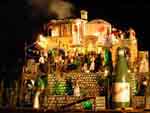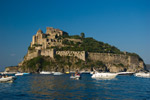The town of Lacco is located at the northern part of the island, bordered to the west with the towns of Forio, Casamicciola to the east, with the same two cities at noon, and with the sea to the north.
Looking this city, from Monte Vico, presents to the eye in the form of an amphitheater: by one hand, it is swallowed by the waves, another side there are the hills of Castanito, Pannella, of Mezzania, and the promontory of the bush Monte Vico, and the more modest of Ebdomade and the lido, which close a semi-circle occupied by the extensive plains planted vineyards and charming villas. It ends on one side at the foot hills shaded by clumps of little selveti and the other side is formed by the extensive sea washed by the waves along its northern extension. The districts Pannella, Mezzania, Monte-House, House-Let, Mud, Cesa, Capital, and others, are included within this small town.
The etymology of the name Lacco, De Siano derives from the Greek pencil in Italian stone, or stony place, and, in fact, he argues: throughout Lacco was - perhaps at his time, or before - full of large masses of white tuff, which although they are broken, in large quantities for use in the factory, there are still especially a fungus that is the figure of the great well located in the sea not far from the shore, which serves mooring and shelter for ships. The Genoese in 1798 called this rock Lacco the very expressive name for the name of the place.
In 1863 they were invited all municipalities in southern Italy to bring those changes, which they believed appropriate, to the ancient names of their cities. The municipality of Forio, believed to add to this, the Royal Decree was authorized the qualifier Ameno and was authorized to call Lacco-Ameno, a name officially preserved.
Considering the veil that covers fables, myths, and traditions of thousands of centuries, and wanting to scrutinize the monuments on the territory of Lacco presents us, we must assume that the first Phoenician colonies to the latest British invasion occurred in 1809, most part, even if you do not want to tell all, they had to arrive to the comfortable and spacious beach of Lacco, and because its largest navy, and because of more secure anchoring.
In fact, legend has it that the Trojan fleet will be repaired in the womb of Marine Lacco, and that colony has occupied this plain with its leader, with the promontory of Monte Vico.
The physicist Dr. Francesco De Siano, native of Lacco, in his operetta, argues that the Greek monuments excavated at that site, the headquarters of the Greek colonies was Lacco, situated in the middle of the island.
But beyond the legends and opinions of local writers, the statue of Hercules, etc. there are many stories to indicate that the first colonies that have occupied this site. The Greeks of the early expeditions, establishing their main headquarters in the valley of Negroponte and other points are stretched along the coast, from Punta Perrone in Monte Vico as it is also the opinion of Jasolino and Oltramontano. The Syracuse who stared at their main center in the Land of Forio lasted until the marina of San Montano Monte Vico and on top of which, built a military bulwark that the eruption of Caccavelli could not destroy.
The famous writer Capaccio argued that the inscriptions on the sepulchral urns, and the names of those extinct, are too truthful testimony, the Romans living in this pleasant beach.
But if all these ancient colonies have landed, have concentrated in our coverage of the territory, we have arguments that have never established a permanent dwelling, perhaps because the place is too exposed, just repaired, or not suitable to their industries or professions, or perhaps because, having planted their cemetery, their burial, in the most romantic and melancholy plains, and on the hill of Monte Vico, and for veneration for the dead, is a sentiment of religion or superstition, they stopped their main headquarters in Forio, but for a place of worship. This place was used and held in awe, the seat of their gods and Penates for the district, was inhabited by the souls of the deceased and from the invisible spirit of their patron, for fear of seeing it was so polluted by new adventurers, was allocated a detachment stationed on Mount Vico, where they were discovered scrap vessels and tiles used in the usual roofs of houses, as well as caves plastered like a tank of oil, or rather of wine and jars.
However if scrap of old factories have been found on Mount Vico, even if there have been houses on the hills of Fundera, House Monti and boundaries, there are signs of old factories along the plain of the sea. So the last part had to be lived. When the pirates disappeared before the fishermen and sailors, then the wealthy bourgeoisie began to build their homes in this pleasant location by the sea.
Too long we have told about these historical details, so we move on to more recent times and say, that the municipality of Ameno Lacco if the timing was very kind of the place of worship and the worship of ancient colonies, as we mentioned, in times of Christianity was regarded as the depositary of the body of a saint. In this regard, here is what he is saying the same De Siano Lacco:
One can not deny that, and still less in the beginning of the fourth century, arrived in this island from Africa to protect the body of the mistress of the same, virgin and martyr St. Restituta, who arrived in a boat in the bloodless shore of the sea of small breast S.Montano called Le Ripe, which are still there as of sand, where she was received and transported to the place, where is her church, and convent of the Carmelite Fathers together, the aquifer south of Monte di Vico already noticed ...
Looking this city, from Monte Vico, presents to the eye in the form of an amphitheater: by one hand, it is swallowed by the waves, another side there are the hills of Castanito, Pannella, of Mezzania, and the promontory of the bush Monte Vico, and the more modest of Ebdomade and the lido, which close a semi-circle occupied by the extensive plains planted vineyards and charming villas. It ends on one side at the foot hills shaded by clumps of little selveti and the other side is formed by the extensive sea washed by the waves along its northern extension. The districts Pannella, Mezzania, Monte-House, House-Let, Mud, Cesa, Capital, and others, are included within this small town.
The etymology of the name Lacco, De Siano derives from the Greek pencil in Italian stone, or stony place, and, in fact, he argues: throughout Lacco was - perhaps at his time, or before - full of large masses of white tuff, which although they are broken, in large quantities for use in the factory, there are still especially a fungus that is the figure of the great well located in the sea not far from the shore, which serves mooring and shelter for ships. The Genoese in 1798 called this rock Lacco the very expressive name for the name of the place.
In 1863 they were invited all municipalities in southern Italy to bring those changes, which they believed appropriate, to the ancient names of their cities. The municipality of Forio, believed to add to this, the Royal Decree was authorized the qualifier Ameno and was authorized to call Lacco-Ameno, a name officially preserved.
Considering the veil that covers fables, myths, and traditions of thousands of centuries, and wanting to scrutinize the monuments on the territory of Lacco presents us, we must assume that the first Phoenician colonies to the latest British invasion occurred in 1809, most part, even if you do not want to tell all, they had to arrive to the comfortable and spacious beach of Lacco, and because its largest navy, and because of more secure anchoring.
In fact, legend has it that the Trojan fleet will be repaired in the womb of Marine Lacco, and that colony has occupied this plain with its leader, with the promontory of Monte Vico.
The physicist Dr. Francesco De Siano, native of Lacco, in his operetta, argues that the Greek monuments excavated at that site, the headquarters of the Greek colonies was Lacco, situated in the middle of the island.
But beyond the legends and opinions of local writers, the statue of Hercules, etc. there are many stories to indicate that the first colonies that have occupied this site. The Greeks of the early expeditions, establishing their main headquarters in the valley of Negroponte and other points are stretched along the coast, from Punta Perrone in Monte Vico as it is also the opinion of Jasolino and Oltramontano. The Syracuse who stared at their main center in the Land of Forio lasted until the marina of San Montano Monte Vico and on top of which, built a military bulwark that the eruption of Caccavelli could not destroy.
The famous writer Capaccio argued that the inscriptions on the sepulchral urns, and the names of those extinct, are too truthful testimony, the Romans living in this pleasant beach.
But if all these ancient colonies have landed, have concentrated in our coverage of the territory, we have arguments that have never established a permanent dwelling, perhaps because the place is too exposed, just repaired, or not suitable to their industries or professions, or perhaps because, having planted their cemetery, their burial, in the most romantic and melancholy plains, and on the hill of Monte Vico, and for veneration for the dead, is a sentiment of religion or superstition, they stopped their main headquarters in Forio, but for a place of worship. This place was used and held in awe, the seat of their gods and Penates for the district, was inhabited by the souls of the deceased and from the invisible spirit of their patron, for fear of seeing it was so polluted by new adventurers, was allocated a detachment stationed on Mount Vico, where they were discovered scrap vessels and tiles used in the usual roofs of houses, as well as caves plastered like a tank of oil, or rather of wine and jars.
However if scrap of old factories have been found on Mount Vico, even if there have been houses on the hills of Fundera, House Monti and boundaries, there are signs of old factories along the plain of the sea. So the last part had to be lived. When the pirates disappeared before the fishermen and sailors, then the wealthy bourgeoisie began to build their homes in this pleasant location by the sea.
Too long we have told about these historical details, so we move on to more recent times and say, that the municipality of Ameno Lacco if the timing was very kind of the place of worship and the worship of ancient colonies, as we mentioned, in times of Christianity was regarded as the depositary of the body of a saint. In this regard, here is what he is saying the same De Siano Lacco:
One can not deny that, and still less in the beginning of the fourth century, arrived in this island from Africa to protect the body of the mistress of the same, virgin and martyr St. Restituta, who arrived in a boat in the bloodless shore of the sea of small breast S.Montano called Le Ripe, which are still there as of sand, where she was received and transported to the place, where is her church, and convent of the Carmelite Fathers together, the aquifer south of Monte di Vico already noticed ...







